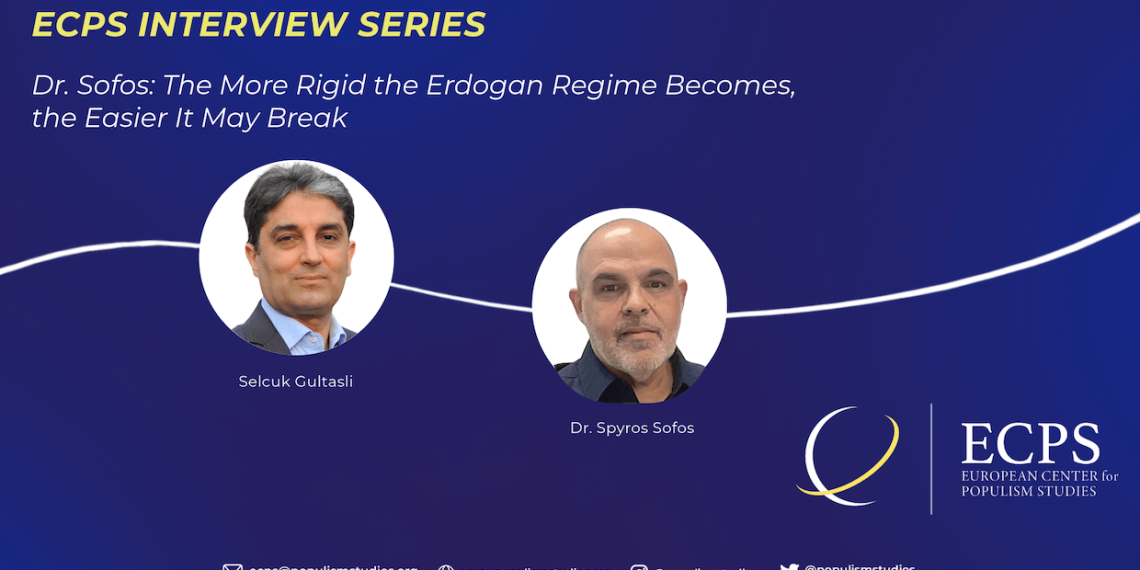“The more rigid the regime becomes, the more easily it may break,” warns Dr. Spyros Sofos in an illuminating interview with ECPS. Tracing the Erdogan regime’s shift from reformist Islamism to a personalized authoritarianism, Dr. Sofos highlights how the dismantling of institutional checks and grassroots engagement has deepened Turkey’s democratic crisis. He sharply critiques the EU and US for enabling this drift, arguing that their silence—rooted in strategic pragmatism over refugee control and regional stability—amounts to tacit complicity. As Erdogan’s rule grows more centralized and brittle, Dr. Sofos suggests its very inflexibility could be its undoing. Amid repression and international complacency, he insists, spaces for resistance persist—and the next rupture may come from within the regime itself.
Interview by Selcuk Gultasli
In a timely and far-reaching interview with the European Center for Populism Studies (ECPS), Dr. Spyros Sofos—Assistant Professor in Global Humanities at Simon Fraser University—offers a deeply informed and critical analysis of the Erdogan regime’s evolution into an increasingly rigid and personalized form of authoritarian populism. “The more rigid the regime becomes,” Dr. Sofos warns, “the more easily it may break.” Far from being a sign of consolidated power, he argues, the regime’s escalation of repression—most recently with the arrest of Istanbul Mayor Ekrem Imamoglu—betrays deep insecurity and structural fragility within a system that has steadily dismantled institutional checks and blurred distinctions between state, party, and judiciary.
Dr. Sofos traces how the AKP’s early reformist stance, driven in part by strategic engagement with European institutions, gave way to a calculated centralization of power following institutional resistance from the military and judiciary. He explores the AKP’s ideological recalibration—through religious nationalism, neo-Ottoman nostalgia, and pan-Turkic outreach—as a tactical means to expand and solidify its coalition amid economic turmoil and intra-Islamist fragmentation.
Yet just as trenchant is his critique of the European Union and the broader West, whose response to Turkey’s democratic backsliding has been marked by passivity and strategic self-interest. “Effectively, what the EU and the US have been doing is wanting Turkey to ensure that the masses of displaced people within its territory would not move towards the West,” he states bluntly. In prioritizing border control, security cooperation, and transactional diplomacy over democratic principles, Western powers have turned a blind eye to the regime’s authoritarian escalation—signaling tacit approval through their silence. Dr. Sofos calls out this hypocrisy, echoing Imamoglu’s own condemnation of European leaders for abandoning not just him personally, but the very idea of democracy in Turkey.
He also warns that the West’s failure to push back meaningfully against Erdogan’s authoritarian turn—driven by domestic electoral concerns and geopolitical calculus—risks normalizing the erosion of democracy, both in Turkey and beyond. With comparative insights from Hungary, India, and Israel, Dr. Sofos situates the Turkish case within a wider global trend of populist-authoritarian drift, but insists that this is not a one-way trajectory. The regime’s internal contradictions, coupled with mounting grassroots resistance and international hypocrisy fatigue, may yet create opportunities for democratic renewal.
This interview is not only a sobering account of democratic decline in Turkey, but also a compelling indictment of Western complacency in the face of it.


